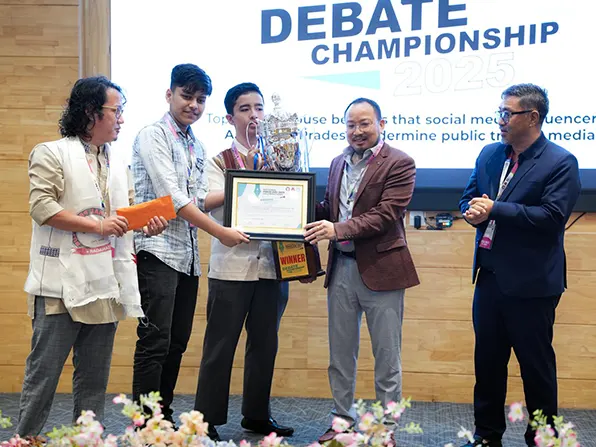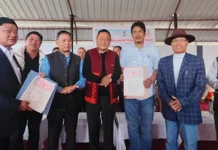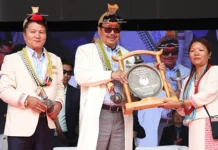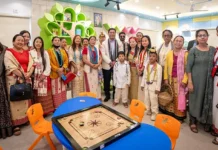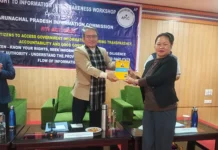National Press Day
ITANAGAR, 17 Nov: The National Press Day (NPD) celebration in Arunachal Pradesh on Sunday saw strong, introspective calls for media ethics, accountability and digital-age resilience, with Law and Legislative Minister Kento Jini urging journalists to uphold sincerity and truth, and the APUWJ president issuing a sharp caution against the growing “nuisance” of unethical and sensational reporting.
Speaking as chief guest, Jini said that a free press is “a responsibility, not a privilege,” stressing that Indian democracy derives its strength from an independent and ethical media. He reminded journalists that verification, investigation and accuracy must remain the bedrock of reporting. Journalism, he added, should expose corruption, safeguard transparency, and act as the constitutional fourth pillar of democracy.
Calling journalism, a “vulnerable profession” targeted through frequent defamation cases, Jini warned against misinformation, particularly during elections, saying that misleading exit polls can erode public trust. “Clean and fair journalism must be the guiding principle,” he said.
IPR Director Gijum Tali underscored the need for stronger coordination between the media and the government’s communication systems. He urged journalists to uphold discipline, especially in the digital domain where content spreads rapidly and can shape public perception instantly.
“The freedom of the press must walk hand in hand with responsibility. When institutions work together with honesty and restraint, public faith in journalism grows,” he said, assuring continued support from the department for strengthening media capacity and ethical practices in the state.
Arunachal Pradesh Union of Working Journalists (APUWJ) President Amar Sangno said that the 61st National Press Day comes at a time when artificial intelligence (AI) is transforming journalism, calling it a “double-edged sword” that offers efficiency and new formats but also fuels deepfakes, misinformation and erosion of trust.
“Fake news travels from Tawang to Vijaynagar in minutes, but the truth often takes days,” he said, stressing that journalists must rely on “boots on the ground and trust in the community.”
Sangno condemned the recent publication of an interview with a minor victim in the Mebo child abuse case, calling it “insensitive and unethical,” and extended apologies on behalf of the APC and the APUWJ. He cautioned against self-styled mediapersons who “turn journalism into a nuisance,” and said that the profession should remain a platform for truth, not rabble-rousing.
He said empathy must guide reporting, particularly for marginalised communities, and added that audiences also share blame for media decline.
“When people choose drama over depth and clickbait over context, fine journalism suffers.”
Sangno urged the government to implement the Arunachal Pradesh Electronic and Digital Media Advertisement Policy and requested the IPR to curb fake viewership bought by digital channels. He also criticised the bureaucratic rejection of the 2020 Working Journalists Pension Scheme, calling it a violation of a budget announcement. Ensuring social security for journalists, he said, is essential for strengthening press freedom and democratic accountability.
In his keynote, Nitin Sethi, Delhi-based senior journalist and the founding editor of The Reporters Collective, said that digital tools have democratised journalism but also blurred the lines between professional reporting and general content creation. “Reporting the truth is especially challenging in close-knit regions like the Northeast, where journalists often report on people they know personally,” he said.
Despite this, he urged young reporters to persevere, saying that “good journalism is most needed in difficult times and still commands deep public respect.”
Arunachal Press Club (APC) President Dodum Yangfo said this year’s theme – ‘Upholding India’s fourth pillar in the digital age’ – was “timely and urgent,” noting that while technology has increased speed and accessibility, it has also amplified “noise, misinformation and confusion.”
“It is our duty to rise above the noise and protect the values that define good journalism,” he said.
Addressing young reporters, Yangfo urged them to learn from keynote speaker Nitin Sethi, calling him “a journalist whose work speaks for itself.” He also congratulated the winners of the Taro Chatung and V Ravindran Excellence Awards and welcomed 10 new APC members, urging them to uphold ethics and credibility.
“In a world full of noise, let us be the voice that is clear, honest and brave,” he said.
APUWJ General Secretary Sonam Jelly expressed appreciation for the dignitaries, speakers, awardees and participants for reinforcing the spirit of responsible journalism. He urged young reporters to “carry today’s lessons into everyday practice” and reminded the fraternity that “credibility remains a journalist’s greatest asset.”
The event, organised by the APC in association with the Information and Public Relations Department, also featured a debate competition, felicitation of ‘Unsung Heroes’ and presentation of V Ravindran and Taro Chatung excellence in journalism awards.
Ojhswi Raj and Abing Taki of the NERIST emerged the winners of the debate competition which was held on the motion ‘This house believes that social media influencers in Arunachal Pradesh undermine public trust in the media’. It saw participation from several institutions across the state.
Gangjai Gangsa and Kabak Ampi of Don Bosco College, Jollang, secured the second runner-up position. Gangsa was also declared the ‘best speaker’ of the event for his articulate and compelling presentation.
The gathering also saw the presence of Arunachal Publishers and Broadcasters Guild (APBG) President Chopa Cheda, Arunachal Electronic and Digital Media Association (AEDMA) President JT Tagam, and IPR Deputy Director Denga Bengia, among others.
NPD celebrated in Pasighat (prem taba)
National Press Day was celebrated at the Arunachal Pradesh University (APU) in East Siang HQ Pasighatwith a programme jointly organised by the Pasighat Press Club (PPC), the APU mass communication department, and the DIPRO office.
Speaking on the occasion, APU Vice-Chancellor Prof Tomo Riba described the media as the “mouthpiece of society.”
He emphasised that journalism is not merely about reporting events but about serving society with truth, fairness, and accountability.
Prof Riba urged journalists to uphold sincerity and integrity in their work, reminding them that the credibility of the press rests on its moral conduct.
He noted that in an era of rapid technological change, the responsibility of the media has only grown, as citizens rely on it to make sense of complex issues and to hold institutions accountable.
East Siang Deputy Commissioner Sonalika Jiwani in her address cautioned against the growing trend of sensationalism in reporting, stressing that credibility must come from fact-checking and sensitivity, rather than from chasing popularity.
She highlighted the dangers of social media-driven sensationalism, where unverified information can spread rapidly and cause harm. She reminded journalists that their duty is to inform responsibly, not to influence for personal gain.
The DC also underscored the importance of ethical reporting in sensitive cases, particularly those involving children and victims of trauma. She urged reporters to seek consent, respect privacy, and avoid intrusive coverage that could deepen suffering.
Beyond ethics, she appealed to the PPC to consider welfare measures such as group insurance schemes for mediapersons, noting the risks associated with the profession.
“Journalism is a demanding occupation, often carried out in difficult terrains and under pressure. Collective welfare measures like insurance can provide a safety net for those who dedicate themselves to this field,” she said.
Encouraging students, Jiwani called for a broader vision in journalism. She urged the mediapersons not to limit themselves to local reporting but to “aspire to national and international platforms.”
Citing the example of documentary filmmaker Abhinav Pandey, whose work on industrial pollution in Rajasthan led to Supreme Court intervention, she emphasised the power of dedicated reporting to bring about real change.
She encouraged young journalists in Arunachal to document the state’s complex issues, warning that without such efforts, valuable stories could be lost.
East Siang Superintendent of Police Pankaj Lambadescribed journalists as the “first responders of democracy.”
He noted that while police are often the first responders in emergencies, journalists play a similar role in the information space, bridging institutions and citizens.
He warned that misinformation spreads faster than verification in the age of social media, often leading to panic, violence, and reputational harm. “A rumour can travel across districts and states in seconds. Fact-checking is not optional; it is a duty,” he said.
The SP stressed that ethics, not technology, give credibility to journalism.
He pointed out that while AI, deepfakes, and algorithm-driven content are changing the media landscape, only responsible reporting can safeguard public trust.
He assured that the district police would continue to maintain transparency and accessibility, strengthening cooperation with the press in crime reporting, awareness campaigns, and citizen education.
He also acknowledged the challenges faced by journalists, often working under pressure and without recognition, and extended respect to their tireless efforts.
PPC President Maksam Tayeng reaffirmed the club’s commitment to ethical journalism. He reminded members of their responsibility to maintain high standards, particularly in sensitive cases involving women and children, and cautioned against misreporting by unverified outlets.
He stressed that the PPC would strictly enforce guidelines to safeguard journalistic integrity and credibility.
Adding an academic perspective, APU Mass Communication HoD (i/c) Dr Prem Taba reflected on the transformation of media in the age of artificial intelligence.
He noted that journalism has shifted from the information age to the attention age, “where the role of journalists is no longer to act as gatekeepers but as sense-makers and verifiers in an ocean of information.”
He emphasised that credibility now depends on verification and clarity, and urged the students to uphold the values of truth and responsibility.
He also informed that an essay writing competition on ‘The Evolving nature of media in the age of artificial intelligence’ was conducted by the department as part of the NPD celebration. In the competition, Domong Mibang (MA mass communication, APU) won the first prize, followed by Kangkeng Modi (MA sociology, APU) and Otik Borang (MA mass communication, APU). Consolation prizes went to Omem Tayeng (MCom, APU) and Jyoti Bacha (MA, mass communication, APU).
Mediapersons were also felicitated for their contributions, with Toram Melong (IPR, PPC) recognised as best worker of the PPC and Opak Regon awarded as the ‘second best dedicated worker’.
The PPC also commended the service of the media houses associated with it and felicitated them on the occasion.
The programme also featured a workshop on ‘Media ethics, ground work & problems faced by reporters during field work’, which engaged students and professionals in discussions on the challenges of contemporary journalism.
Earlier, the programme began with paying of floral tributes to media pioneers late Taro Chatung and late V Ravindran, and an address by PPC general secretary Mingkeng Osik.
Among others, APU faculty members, administrative staff, students, media professionals, district officials and members of the PPC attended the event.

